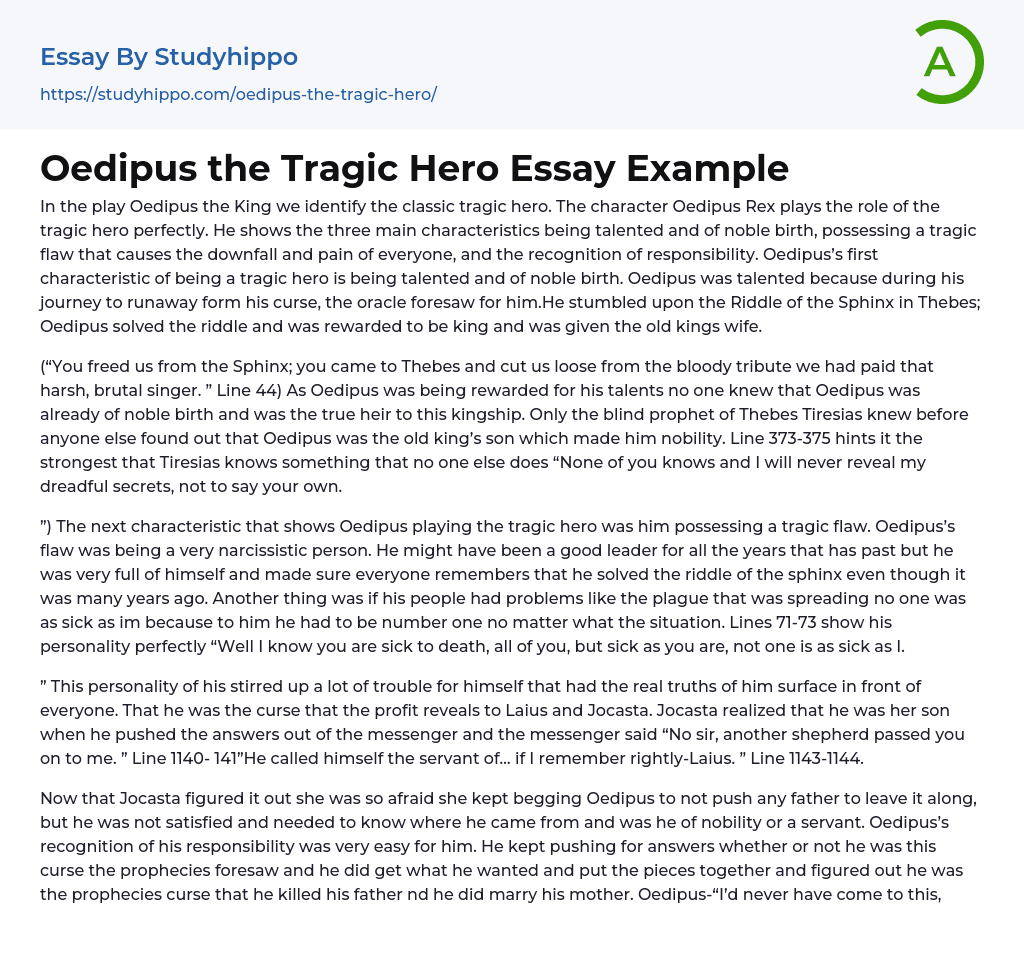The main character of the play Oedipus the King, Oedipus Rex, embodies the classic traits of a tragic hero. He possesses exceptional talent and noble lineage, but also has a tragic flaw that leads to widespread suffering. Despite this, he ultimately acknowledges his own culpability in his downfall. Oedipus's remarkable abilities and aristocratic background are key components of his first characteristic as a tragic hero. By successfully solving the Riddle of the Sphinx during his escape from a curse, he became king and married the former king's wife.
In line 44, it was acknowledged that Oedipus had saved Thebes from the Sphinx and released them from the harsh tribute demanded by the brutal singer. Despite it all, no one was aware that Oedipus had already been born into nobility and was the rightful ruler. Only Tiresia
...s, the blind prophet of Thebes, had prior knowledge about Oedipus' true identity as the old king's son and his elevated status. Line 373-375 strongly implies that Tiresias possessed exclusive knowledge when he declared, "None of you knows and I will never reveal my dreadful secrets, not to say your own."
The tragic hero characteristic that Oedipus displayed was having a tragic flaw, specifically his narcissism. Although he had been a successful leader for years, he constantly reminded everyone of his victory over the sphinx in the past and believed himself to be superior even during crises such as a spreading plague. Evidence of this can be seen in lines 71-73 when he says, "Well I know you are sick to death, all of you, but sick as you are, not one is as sick as I."
"This individual's personality caused hi
to create numerous problems for himself, ultimately leading to the revelation of his true identity in front of all. It was revealed that he was the prophesied curse mentioned to Laius and Jocasta. When the messenger was questioned, Jocasta discovered that he was her son when he coerced the answers out of him and the messenger stated, "No sir, another shepherd passed you on to me." (lines 1140-141) The messenger also admitted, "He called himself the servant of... if I remember rightly-Laius." (lines 1143-1144.)
Despite Jocasta's pleas for Oedipus to halt his investigation out of fear and acceptance of the truth, he persisted in his quest. He desired knowledge regarding his status as either noble or a servant, as well as whether there was a curse involved. Ultimately, it became evident that he had unwittingly fulfilled the prophecy by marrying his mother and slaying his father. Oedipus felt remorseful for failing to recognize his fate and considered himself blind. His ensuing nightmarish encounter occurred in the chamber where Jocasta had taken her own life.
The final act witnessed by him was cutting her down, followed by his gouging of her brooches into his eyes - ensuring that he could never see the pain he had caused again. The messenger reminds him that he will no longer witness the pain he caused for too long, being blinded to those he longed to know and see. In conclusion, playing the role of the tragic hero is intense, as demonstrated in Oedipus the King. Initially hated for his selfishness, Oedipus eventually becomes a source of sympathy as more mysteries unfold, revealing him as the cursed one who murdered
his father and wed his mother, fulfilling the prophecies.
- Achilles essays
- Apollo essays
- Gilgamesh essays
- Hercules essays
- Iliad essays
- Myths essays
- Odysseus essays
- Oedipus essays
- Trojan War essays
- Zeus essays
- A Doll's House essays
- A Midsummer Night's Dream essays
- A raisin in the sun essays
- A Streetcar Named Desire essays
- An Inspector Calls essays
- Death of a salesman essays
- Everyman essays
- Fences essays
- Hamlet essays
- Hedda Gabler essays
- Iago essays
- King Lear essays
- Macbeth essays
- Much ado about nothing essays
- Oedipus Rex essays
- Oedipus The King essays
- Othello essays
- Pygmalion essays
- Romeo And Juliet essays
- Tartuffe essays
- The glass menagerie essays
- The Importance of Being Earnest essays
- The Merchant Of Venice essays
- The Taming of The Shrew essays
- Twelfth Night essays
- Waiting For Godot essays
- American Literature essays
- Between The World and Me essays
- Book Report essays
- Book Review essays
- Book Summary essays
- Books essays
- Character essays
- Coming of Age essays
- Dante's Inferno essays
- Everyday Use essays
- Flowers for Algernon essays
- Genre essays
- Greek Mythology essays
- Incidents in The Life of a Slave Girl essays




